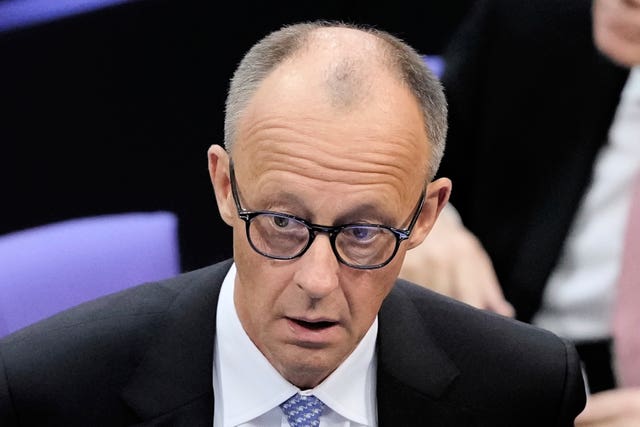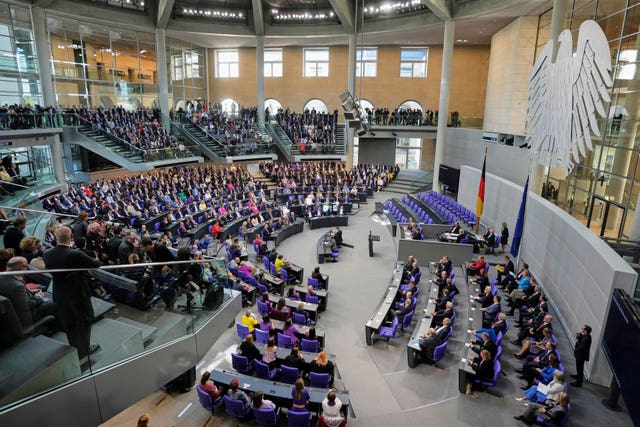Friedrich Merz’s bid to become Germany’s 10th chancellor fails first ballot
A candidate for chancellor has never failed to win on the first ballot since the end of the Second World War.

Conservative leader Friedrich Merz’s bid to become Germany’s 10th chancellor since the Second World War failed in the first round of voting in parliament on Tuesday by six votes, a vote he had been widely expected to win smoothly.
A candidate for chancellor has never failed to win on the first ballot since the end of the war.
Mr Merz needed a majority of 316 out of 630 votes in a secret ballot.
He only received 310 votes.
Because the vote was held by secret ballot, it was not immediately clear — and might never be known — who had defected from Mr Merz’s camp.
Mr Merz’s coalition is led by his centre-right Christian Democratic Union and its Bavarian sister party, the Christian Social Union.
They are joined by the centre-left Social Democrats, outgoing Chancellor Olaf Scholz’s party.
The parties were now to regroup to discuss the next step but it was not immediately clear how long the process could take.

The lower house of parliament — called the Bundestag — has 14 days to elect a candidate with an absolute majority.
Mr Merz can run again, but other legislators can also throw their hat in the ring.
There is no limit to the number of votes that can be held within the two-week period.
If Mr Merz or any other candidate fails to get that majority during the period of 14 days, the constitution allows for the president to appoint the candidate who wins the most votes as chancellor, or to dissolve the Bundestag and hold a new national election.
Mr Merz is seeking to take the helm of the 27-nation European Union’s most populous member after Mr Scholz’s government collapsed last year.
Mr Scholz, despite his official farewell on Monday, remains in a caretaker role until a new chancellor takes over.

Germany has the continent’s biggest economy and serves as a diplomatic heavyweight.
Mr Merz’s portfolio would include the war in Ukraine and the Trump administration’s trade policy on top of domestic issues such as the stagnant economy and the rise of a far-right, anti-immigrant party.
Alice Weidel, co-leader of the far-right, anti-immigrant Alternative for Germany (AfD) party, slammed Mr Merz’s failure as proof that his coalition has a “weak foundation”.
AfD is the biggest opposition party in Germany’s new parliament after it placed second in the national elections in February.
Despite its historic gains, it was shut out of coalition talks due to the so-called “firewall” that mainstream German political parties have upheld against co-operating with far-right parties since the end of the war.
The US administration has criticised Germany repeatedly since President Donald Trump’s inauguration in January. Mr Trump, who has German roots, had often expressed his dislike of former chancellor Angela Merkel during his first term in office.

This time around, Mr Trump’s lieutenants are at the forefront — tech billionaire and Trump ally Elon Musk has supported AfD for months. He hosted a chat with Ms Weidel that he livestreamed on X earlier this year to amplify her party’s message.
US Vice President JD Vance, during the Munich Security Conference in February, assailed the “firewall” and later met Ms Weidel, a move that German officials heavily criticised.
Last week, the German domestic intelligence service said it has classified AfD as a “right-wing extremist” organisation, making it subject to greater and broader surveillance.
The decision by the Federal Office for the Protection of the Constitution prompted reaction from US Secretary of State Marco Rubio and Mr Vance over the weekend. Germany’s Foreign Ministry hit back at Mr Rubio after he called on the country to undo the classification.
The domestic intelligence service’s measure does not amount to a ban of the party, which can only take place through a request by either of parliament’s two chambers or the federal government through the Federal Constitutional Court.
Mr Merz has not commented publicly on the intelligence service’s decision.





